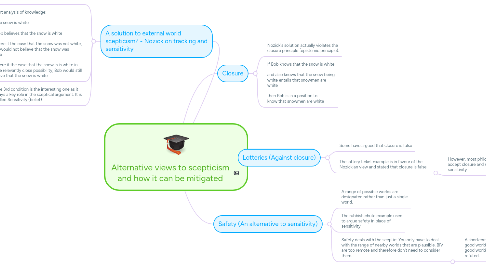Alternative views to scepticism and how it can be mitigated
by Anna Bromely


1. A solution to external world scepticism? - Nozick on tracking and sensitivity
1.1. Built on the idea of a counterfactual conditional. e.g. 'Were Oswald not to have shot Kennedy, someone else would have.' (A contrary to fact conditional based on other possibilities)
1.2. 4 part analysis of knowledge: 1-The snow is white 2-Bob believes that the snow is white 3-Were it the case that the snow was not white, Bob would not believe that the snow was white 4-Were it the case that the snow is is white in some relevantly close possibility, Bob would still believe that the snow is white
1.3. The 3rd condition is the interesting one as it plays a key role in the sceptical argument. It is called Sensitivity (belief)
1.3.1. To understand how sensitivity bears on scepticism the notion of possible worlds is introduced.
2. Closure
2.1. Nozick's solution actually violates the closure principle (epistemic principle).
2.2. If Bob knows that the snow is white and also knows that the snow being white entails that snowmen are white then Bob is in a position to know that snowmen are white
3. Lotteries (Against closure)
3.1. Some have argued that closure is false
3.2. The lottery ticket example is in favour of the Nozickian view and stated that closure is false
3.2.1. However, most philosophers accept closure and reject sensitivity
4. Safety (An alternative to sensitivity)
4.1. A range of possible worlds are designated rather than just a single world.
4.2. The rubbish chute example used to argue safety in place of sensitivity
4.3. Safety deals with the sceptic: You only have to deal with the range of nearby worlds that are plausible. BIV are too remote and therefore don't need to consider them.
4.3.1. A shortcoming is that it only works if you assume you are in the good world. What reason have you given to say you are in a good world. You need this or scepticism hasn't really been refuted.
4.3.1.1. This in fact makes the argument inferior to Putnam's as his works independently of any assumption about whether in good or bad world.
